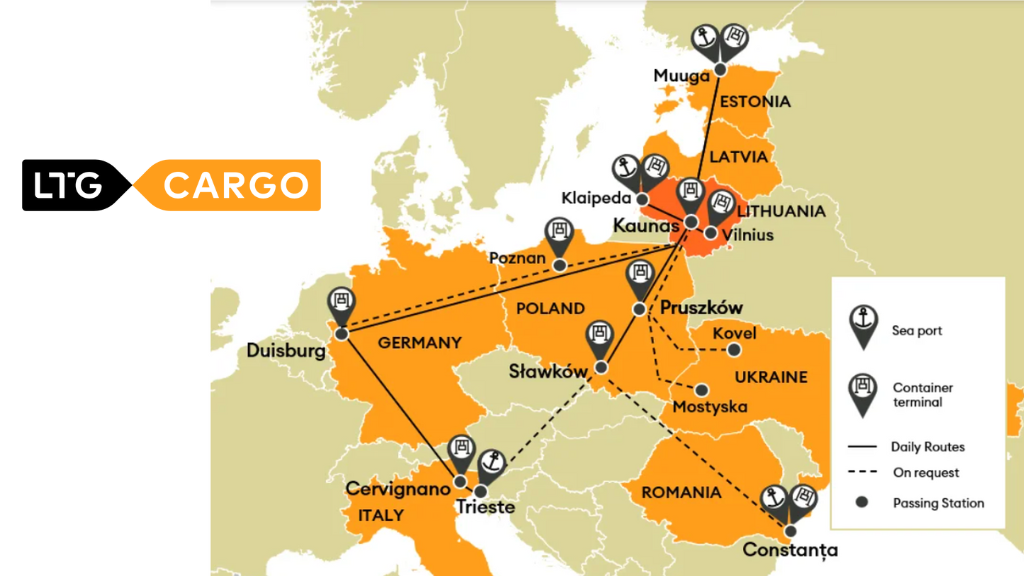LTG Cargo is increasing its volume in EU
LTG Cargo, a freight transport company of the Lithuanian Railways group, is expanding the scope of intermodal transportation in the region. As more and more business customers across Europe are looking for more sustainable logistics solutions, the company is setting a strategic goal – to increase the share of more sustainable and environmentally friendly shipments, for this purpose transport connections with the West are being developed.
Focus on more sustainable intermodal transport
The European Commission forecasts that road freight transport will increase by around 40% by 2030 and almost twice by 2050. However, it is one of the most polluting methods of transportation. Freight transport accounts for more than 30% of carbon dioxide emissions from transport in the European Union.
“The European Union’s transport policy aims to reduce road haulage by promoting more environmentally friendly and energy-efficient modes of transport. One of these is intermodal transport. This is also the direction we are taking with the strategic goal of promoting the sustainable transportation of goods. We aim to be the central link of intermodal transport in our region with the West,” Eglė Šimė, the Head of LTG Cargo, reviews the situation.
LTG Cargo plans that the company’s development of connections towards Germany (to Duisburg) and Poland (to Slavkov) will also contribute to the development of intermodal transportation services. The latter country is actively engaged in development – LTG Cargo Polska, which has 31 locomotives, has become one of the fastest growing companies in the sector in the first half of the year.
Message from the European institutions – change is coming up
The European institutions aim to give impetus to the development of intermodal transport. One of the measures to give impetus to market change is the European Commission’s directives, which aim to increase the competitiveness of combined transport by performing as little travel as possible by conventional road transport.
“Europe’s message to hauliers is clear: the social and environmental costs of transport should be paid in accordance with the ‘polluter pays’ principle. European countries, especially their business sector, are under increasing pressure from buyers to ensure that their goods are not only sustainable, but also reach them sustainably. Therefore, it is necessary for businesses to look for innovations, new and more sustainable ways of transportation and greater integration of the entire system,” says E. Šimė.
According to E. Šimė, LTG Cargo is also taking the lead in the Baltic region – the aim is to develop new routes connecting Lithuania with other Baltic states. Moving towards even more sustainable logistics, the company has taken a wide range of measures – the company is one of the first companies in the Baltic States to buy electric locomotives, and also encourages customers to use an economically useful system of carbon dioxide certificates. In Lithuania, there is no subsidy for savings in carbon dioxide in transportation, but in other countries, companies that have them can receive tax incentives.
There is no time to wait
Europe’s logistics business leaders are also taking steps to find more sustainable transport solutions. The logistics group Girteka, which manages the largest truck fleet in Europe, is expanding its portfolio of intermodal services and aims to become one of the leading suppliers in Europe.
“We take an integrated approach and combine different modes of transport. We believe that our path, the initiatives we have created, promote greater sustainability and provide a unique opportunity in innovative, more innovative – than usual – ways to transport goods. To achieve this, we need to work closely with partners, customers and review the entire transport network. This means that a lot of preparatory work must be done at this time,” stresses Viktorija Terekė, Head of Sustainability at Girteka Europe West.
According to V. Terekė, the possibilities of new routes in Europe are being actively explored, but the biggest challenge is the existing infrastructure. By 2025, the Girteka Group plans to carry out as much as 20% of long-distance shipments by rail and ferry: short distances are to be covered by electric trucks, and longer distances are transported by intermodal transport.
“We don’t have time to wait – we have to take it and act. Infrastructure development would be one of the key points. Another aspect is the need for a very clear and consistent subsidy logic. Unifying legislation in all countries would be one of the options and solutions. At the moment, probably Germany is the most advanced state in the field of granting subsidies. Perhaps other countries could pay attention to this too,” said Tereke.
Original article HERE
Image source: ltgcargo.lt

